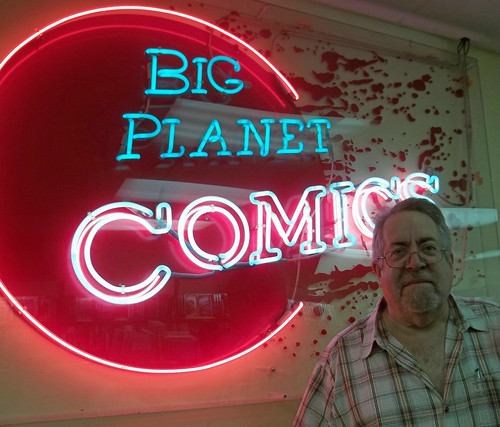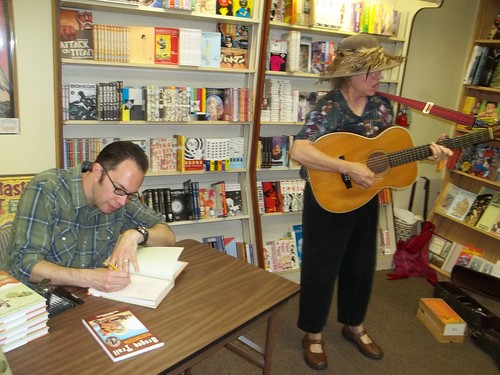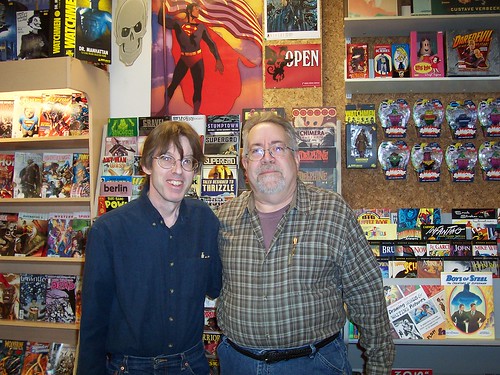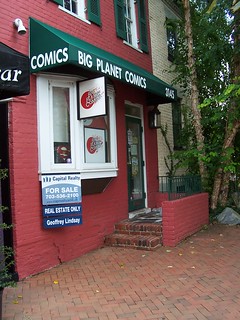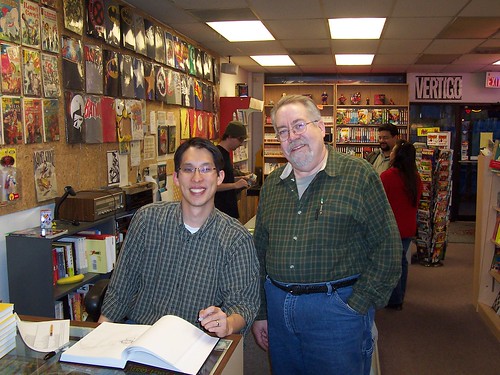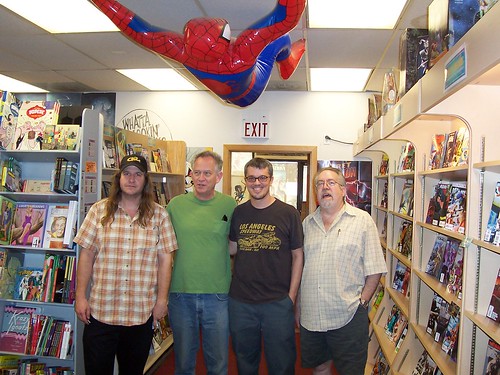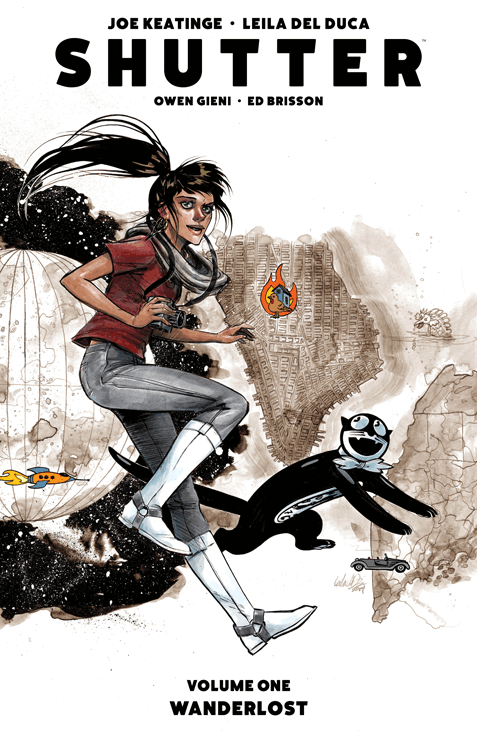by Mike Rhode
(recorded in March 2017)
Christian Panas recently stopped back in the area for a few weeks, prior to moving to Japan. I was able to have one interview session with him while he was in town. This is edited by me for clarity, but has not been edited by Panas. Greg McElhatton has written to me with a response which is appended at the end, while being asterisked in the text at the places he indicated; since I was not involved in the show and have not deeply studied the history of it, I am only presenting what people say, and not attempting to determine any 'truth.'
Mike Rhode: When did you work on SPX?
Christian Panas: I would say 1997-2000.
MR: What was your role there?
CP: I started as a volunteer. I ended up working with the steering committee and I guess I was technically executive director for two years.*
MR: How did you start volunteering?
CP: I had moved back from Chicago to the area in '97 and wandered in to Big Planet Comics in Vienna. That's how I met Greg Bennett, and how I got interested in comics again. I had stopped reading them. I read comics from 4 years old through high school, and then just lost interest. It wasn't until I rolled into Big Planet and saw a lot of alternative press comics that was coming out that I got interested again. I found out about SPX and decided to volunteer and I had a blast, meeting those creators and seeing what was coming out. I just got really enthused about it. It was a real pleasure.
MR: Who were you reading at the time that sucked you back in?
CP: There was that whole movement with the Fort Thunder guys. Kurt Wolfgang. There was plenty of Fantagraphics that I had missed. I hadn't realized that Ivan Brunetti was putting out comics. He did a student comic strip at the University of Chicago when I was there.
MR: You liked the more "primitive" type of look then?
CP: Yeah, that's what got me back in. I always loved European and South American albums too, that were more polished, but still raw and powerful. This was lots of what Fantagraphics was putting out. At the time I discovered Munoz and Sampayo. Munoz blew my mind, and I got to meet him when I went to Angouleme in '99 with Greg. There were also guys like Top Shelf, Jeff Mason's Alternative Press… between finding foreign stuff that I had missed and all the American indy stuff that I had no clue about, it really opened my eyes.
MR: So how did your role from volunteer to executive director evolve?
CP: It happened really suddenly. I was working at the Smithsonian's Natural History Museum at the time, and I was doing a lot of cultural work in the anthropology department. We were working with other institutions so I went to Japan and Thailand, and I had experience working with artists in Trinidad & Tobago, and other things. I'll be very honest. I think part of it had to do with not being sure who wanted to be executive director at the time and part of it was that I was good at having rapport with people. I was good with schmoozing. We'd have those wonderful parties. At one of the SPX's when I was executive director we had in a Swiss cartoonist, and between folks like him and Joe Sacco, and Bob Sikoryak... I just had a good affinity and inclination to putting those people at ease, and drawing them out… making them feel welcome. To be honest, if I had anything to contribute, I think it was that. I think a lot of other people were involved in the real work of the show.
MR: Who else was involved with you at this time?
CP: There was Karen Flage, Greg McElhatton, Greg Bennett, Craig Thomas… I also helped edit the 1999 and 2000 anthologies with Chris Oarr and Tom Devlin. We got nominated for the Eisner which was a lot of fun.
MR: So did people undertake the job they could fulfill the best, or did you have to assign work to people?
CP: No, I was technically executive director, but literally it was the group meeting and functioning in an anarchistic sense – the good sense, not the chaotic one – self-actualized. Towards the end as I was having certain difficulties in my life, people ended up having to take up my slack.
MR: Where was SPX actually being held when you were working on it?
CP: In Bethesda.
MR: Were you involved with the Silver Spring interregnum?
CP: No, no.
MR: Chris Oarr was still director of the Comic Book Legal Defense Fund (CBLDF) at the time, and you were working with Chris?
CP: I don't think he'd been doing it that long at that point, and in some way I was taking over executive directorship of the show from him.
MR: These were the days when it was still largely seat of its pants. Were you there when the parallel track with ICAF was going on?
CP: Yes. I have heard about difficulties and after I was involved, there was a split, but when I was involved, it seemed to be really great synergy. The artists that they brought were phenomenal. It felt really perfect to me. It was one of the many reasons I loved that show so much. The programming that they brought added such richness and depth, although I have to tell you I've been to one or two conventions in my life, including Angouleme, so I don't have much to compare to.
MR: SPX didn't really have any programming before that point, except for a few small press business things and a retailer thing on Sundays.
CP: Yes, exactly. And the softball game. We did have that retailers meeting and that was pretty much the program.
MR: It was in Bethesda in that little hotel with the two levels and it was outgrowing it rapidly at that point, I would imagine…
CP: It was really packed by the end. I remember it was an issue we were talking about constantly and trying to figure it out. A lot of people complained that getting tables was tough. As a show, my understanding is that is when it really took off in terms of filling up with crowds. It became a real indy (as opposed to local) show. At every stage, I remember how many of the creators who came spoke of it with real wonder and love, and spoke of it as a show that was feeding them.
MR: People make money every year, and some have been coming since the beginning… What were some of your successes?
CP: To me personally, it was just being involved with a lot of good people and being able to help provide that venue and that excitement and support to those creators. That felt really great. I can't remember how well it did in terms of sales, or publicity, and I wasn't the architect of new policies, but it felt incredibly fulfilling just making it happen.
MR: At the time, it was purely a fundraiser for the CBLDF, and that very well might still be the case, but I think it makes more money for the artists than it used to, and that's a concern for people who want to come since there are so many competing conventions. There's essentially a convention every weekend in America now, and people have to make an active choice to come to SPX now. Back then, there were only two relevant cons – SPX and APE.
CP: There's so much less distinction in terms of pop culture and knowledge. People know these creators and books more than they used to. It did feel seat-of-the-pants in a positive way, but those people on the committee … and Steve Conley was also a big part of it… worked extremely hard and did a great job. I guess one of my successes … working on the anthologies I really loved.
MR: Did the anthologies already exist when you started volunteering?
CP: Yes.
MR: And they kept getting thicker and thicker every year…
CP: In 1998, or 1999, the one that got nominated for an Eisner – there was controversy with people who felt that some of it was too experimental.
MR: How did material get chosen for those?
CP: My vague recollection is that Chris and Tom and myself got submissions, and we met with Adhouse Book's Chris Pitzer who was the fourth in that group. I had my roommate Greg McEllhatton and Karen Flage look at the comics too, to get their input and to create a shortlist. Then Chris Pitzer, Chris Oarr, Tom Devlin and I holed up and went through and hammered out which ones we wanted in and and what order to put them in.
MR: So Pitzer's been running his own
publishing house for over two decades, and Devlin joined Drawn & Quarterly and is now the co-publisher, so I guess the experience was good for them too. Is there anything you can recall as a particular failure?
CP: I don't remember anything in particular.
MR: What were some of the more memorable events?
CP: We had Frank Miller and Neil Gaiman in. They were big names. For us, they were huge names. Honestly, my interest was a lot more to the people ICAF brought over. I remember sitting and having a drink with Will Eisner one night at the bar. I just remember how awesome that was -- the two of us randomly having a drink. Joe Sacco was a person I really loved talking to. I think we had the American debut of the Comix 2000 silent comics compilation and some of the L'Association guys. That was incredible. But having the likes of Miller and Gaiman show up for the CBLDF was a really big deal and it drew people. It gave support to the CBLDF and was great for us. After 300, talking Greek history at the after party with Frank Miller was fun. I made the mistake of framing a question I asked along the lines of 'how does it feel to come back to comics,' and he took offense at that, but I didn't mean it. [laughs]
MR: At some point there was an ill-advised attempt to rebrand SPX as 'The Expo.' Was that in your time?
(courtesy Grand Comics Database)
CP: I do remember that, but I can't tell you much more other than I expressed my opposition to the idea. I don't remember details other than I felt it was totally unnecessary.
CP: I don't know that it needs to be recorded, but one personal hurt I had was, after going out of my way to involve the committee in the anthology and giving them a first look, after we put out the anthology, I got a lot of shit and shit was talked that we somehow did a bad job, picking gratuitously weird stuff. But that's just human. That's really the only negative thing I can even remember from time. My time was limited and in the second year I was executive director, I had to bail. Greg Bennett and some other people saved me, because I was having personal issues at the time. They stepped in and picked up the slack, and took it over. 99%+ of my experience and feelings were great.
MR: Favorite parts? Least favorite parts?
CP: I loved the party afterwards! I have to say, and I helped throw it, but I had a facility for that aspect and enjoying it.
MR: The Ignatz awards?
CP: I was not involved with them. There were issues with getting the finished bricks, and I'm sure there were other, more substantive issues, but I wasn't aware of any other problems.
MR: The CBLDF used to hold an auction on the floor. Did you ever buy anything?
CP: I was never a great collector. I got stuff growing up that I liked, but I never had the collector mentality.
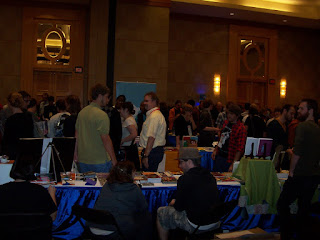
(Small Press Expo, September 2009. Crowd including Jeff Alexander.)
MR: Who took over after you left? Was that Jeff Alexander?**
CP: Yeah. Jeff had been involved before me. I met Jeff at Big Planet too, through Greg. Greg used to have to people over to his house. I think that's how a lot of us got involved with the show, and that's how I met Jeff. In the summers, Greg would have Hong Kong film festival parties and put a screen up in his back yard and have a barbecue. Jeff would bring whatever anime or HK films that he had. I think he was predominantly involved with the Ignatz at the time, and that was his main responsibility. Greg McElhatton, Karon Flage, Jeff and Steve Conley and I used to get together on occasional Friday evenings for drink and dinner after work.
The steering committee and the volunteers were a bunch of overall really enthused people who were self-motivated. The committee as a whole seemed to work well, figuring out who would do what, with people stepping in to fill in when needed in places. For me, in that period of the time, it was largely an incredibly pleasant blur.
*Greg McElhatton has written in, stating, "Christian Panas was not executive director for two years, but just a
matter of months. He briefly took over in that position in the fall of
2000, after the 2000 show had ended (and the last of the three years
that Michael Zarlenga was executive director). By the spring of 2001,
Christian was no longer executive director or in fact on the Board or
the Steering Committee. At that point, Greg Bennett and I took over as
co-executive directors in an attempt to make sure the show would even
happen. (As it turned out, the show was scheduled for September 14-16,
2001 and ended up cancelled for events out of our control. But it was on
track to occur and we'd even gotten the front page of the Washington
Post Weekend section.)"
**McElhatton states, "I ended up serving as executive director for 2002-2003, with a
tremendous amount of assistance (and as assistant executive director)
from Greg Bennett, without whom I couldn't have achieved a lot. Steve
Conley was the director for the 2004-2006 shows, Karon Flage for
2007-2009, and then Jeff Alexander was in 2010. Warren Bernard took over
in 2011 and has continued to run the show since then."
"(And
before then, Lou Danoff and Jon Cohen founded the show in 1994; Chris
Oarr ran the show in 1995-1997, and then Michael Zarlenga was executive
director in 1998-2000.)"






